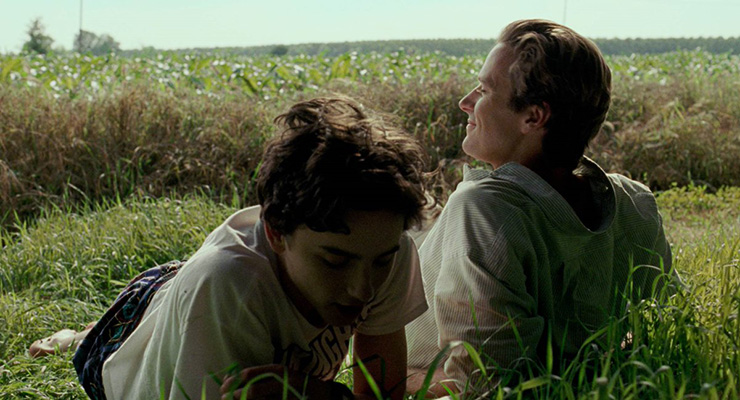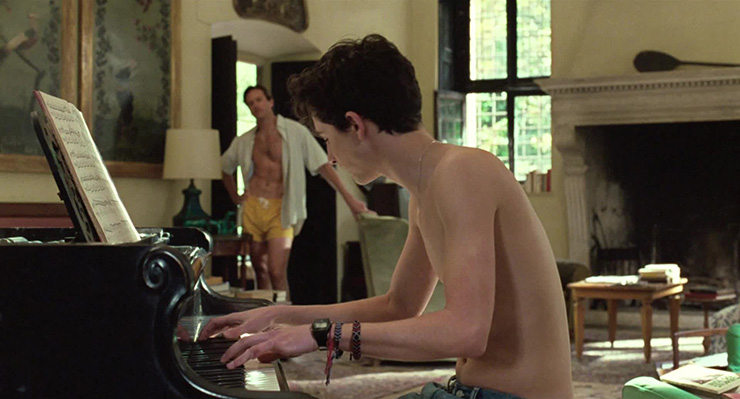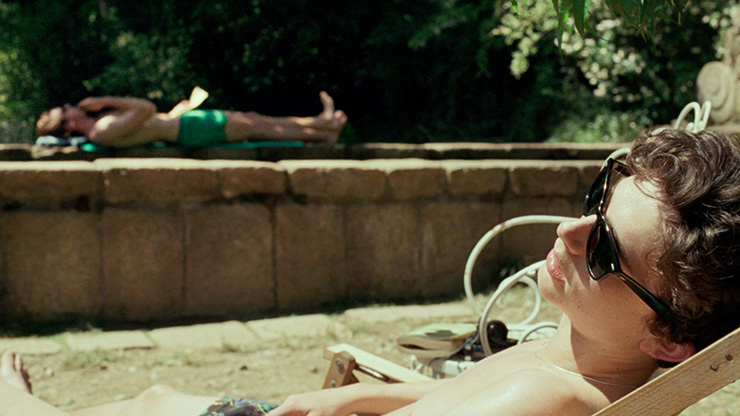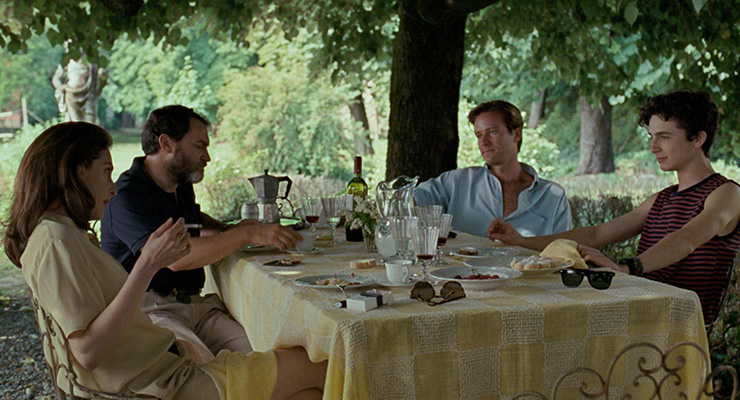
Timothée Chalamet, Armie Hammer
“Call Me by Your Name” is a film of old creaky bedrooms, of pristine water splashing against smooth skin, of bicycle tires slicing through well-trodden country roads. It's a gallery of furtive glances that builds to a concerto of tender fulfillment, yet unfolds like a lazy European vacation that grows ever fonder with the passage of time. It's dotted with the yearning a faded postcard elicits, yet feels as vivid and immediate as a chance encounter with a former lover. It flows like a deceptively shallow wellspring from which you never want to stop drinking.
To call director Luca Guadagnino's ravishing daydream a coming-of-age film is akin to calling “Babette's Feast” a movie about serving food. But it would also be an accurate description, for this is, after all, Elio Perlman's journey. The sullen teen, the only child in this French-Italian-American-Jewish household, doesn't look like much at first, all gangly limbs and bookish reticence. Prone to pouting and sour moods, he dives into his books and his music to while away those long summer hours, giving the most tacit of acknowledgments to the fact that he is surrounded by Northern Italy's shimmering natural beauty, circa 1983.
But look closer at our scrawny (but cute) protagonist. It doesn't take long to detect a complexity that belies his years, a jumble of contradictory feelings fighting for dominance of his head, and later, his heart. There's also an inkling of the man he will become: handsome and giving, but also deeply neurotic. And smart. So smart. But that's still in the future. Seventeen-year-old Elio (Timothée Chalamet) watches from a balcony as his father (the versatile Michael Stuhlbarg), an archaeology scholar, welcomes Oliver (Armie Hammer), his doctoral assistant for the summer. Elio perks up, instantly struck by this tall drink of water, perhaps more than a little jealous of how confidently the new arrival carries himself.

And then there is desire. Elio, reluctant to admit to himself that his curiosity over the American visitor is spilling over into more intense feelings, instead pursues Zarmia (Esther Garrel), a neighboring teen going through her own growing pains. But Guadagnino makes clear Elio isn't courting Zarmia to sublimate his same-sex longings. He is genuinely smitten by the teenage girl's beauty and independence. The film, an adaptation of André Aciman's 2007 novel, makes no bones about Elio's layered, keenly observed bisexuality.
But what to make of studly, seemingly aloof Oliver? Elio feels a tingle when Oliver puts his hand on his bare shoulders, yet at a nighttime get-together, he looks on as the strapping Yankee, fond of wearing “short shorts,” seduces a local girl. Just what is his deal? Guadagnino, working from a wise, beautifully constructed screenplay by James Ivory (of Merchant Ivory fame), lays on the nuanced stares and body cues in a way that makes it seem like both characters are discovering their feelings right before your eyes.

Guadagnino's also aware of the role the film's picturesque setting plays in how Elio and Oliver's friendship evolves into something more. The “I Am Love” director ensures we become familarized with every nook and cranny of the Perlmans' 17th century villa, as well as Moscazzano's town square and the rural terrain our well-matched duo travel through on bike. If anything, “Call Me by Your Name” is a triumph of ambiance, a high-wire act that aims to cast a spell so we feel, not like an outside observer looking in, but a confidante sitting right next to these two young men who come to find such enrichment in each other's company.
Guadagnino allows the days to blend into each other, allowing Elio and Oliver to bond over Bach and Heidegger, seven-year age gap be damned. Sunbathing and swimming are punctuated by the occasional glimpse of Mr. Perlman and Oliver doing some actual work. (This does seem to be the most relaxed academic assistantship ever captured on celluloid.) When word gets back to them of an ancient statue surfacing on Lake Garda, the discovery neatly dovetails into Elio and Oliver's own stirrings. The ensuing sequence has all the earmarks of Guadagnino's mise en scene, yet also feels like something Ivory would bring to life in his own literary adaptations. This alluring alchemy of sensibilities, blending Ivory's literate worldliness and Guadagnino's more youthful exuberance, yields something that doesn't quite possess the earthy sensuality of Guadagnino's previous work or Ivory's stately rhythms. Those elements are instead reconfigured into something more delicate and rare: a piercingly honest portrayal of first love where the rose-colored glasses never obscure the characters' own hangups.

The burden falls on Chalamet and Hammer to convey the pure joy of Elio and Oliver's connection without shying away from their insecurities and, in Elio's case, a destructive combination of low self-esteem and crippling shame. Both performers come through in ways I'm still mulling over, and I saw this film back in October. They burrow deep beneath their characters' skins long after establishing how complete their bodies feel when they come into contact, like, say, the way Elio bumps his head against Oliver's chest the way a pet cat would. (OK, so Hammer looks a few years older than his character should. It's a suspension of disbelief I was willing to take.) Both actors keep finding shadings that make the ostensibly basic boy-meets-boy trappings of this idyll take on another dimension.
And if their arcs don't include any explicit lovemaking onscreen, what of it? Guadagnino's decision to look away has come under heavy criticism as “Call Me by Your Name” made the festival rounds and the buzz around it grew. Nine times out of ten, I would be the one to throw the first stone if I felt a movie was being too timid in its depiction of same-sex eroticism, but I never got the sense the director was wimping out. Rather, it appears to be a decision linked to sustaining that glow that permeates the film. By opting against a graphic depiction of the characters' carnal consummation, it causes that spark of first love Elio is coming to terms with to linger more pervasively. That warmth exuding from the screen is “Call Me by Your Name's” gift to you. Oh, and there's a foot massage that's hotter than many (most?) sex scenes I've seen this year.

Amira Casar, Michael Stuhlbarg, Armie Hammer, Timothée Chalamet
Love is not the solution to the characters' foibles here. Feelings are still broken. Poor judgment is still displayed. And reaching a romantic goal only opens up a new series of unexpected emotions. But Guadagnino never lets this leisurely paced yet never dull film become bogged down in ennui. It allows its central affair room to breathe. It also portrays Elio's progressive parents as a supportive but unobtrusive presence. (The radiant Amira Casar, plays Elio's mother with understated grace.) In other words, it does just about everything right, even when the people on screen are not. If I had a quibble, and it's pretty minor, it's that Ivory's dialogue during a late-in-the-game heart-to-heart between Elio and his dad feels too perfect. (Stuhlbarg nevertheless knocks his monologue out of the park.) But by then I was too enraptured by what Elio is going through to mind the Oscar-bait moment.
“Call Me by Your Name” ends with a phone conversation of exquisite heartache and longing, followed by a closeup that allows Chalamet the chance to let his eyes convey loss and sadness, but also a newfound resolve. Guadagnino has already expressed an intent to look in on Elio in further installments, much like François Truffaut had his Antoine Doinel series and Richard Linklater his “Before Trilogy.” Here's hoping those films retain the intoxicating pull of this sublime love story, one that bewitched this reviewer, body and soul. When was the last time you saw a movie that you couldn't help but want to throw your arms around and refuse to let go? Guadagnino has crafted just such a transcendent gem.
"Call Be By Your Name" is playing at Living Room Theaters FAU, Regal Shadowood 16, Cinemark Paradise 24, Regal South Beach , and the Tower Theater, where it is subtitled in Spanish.




